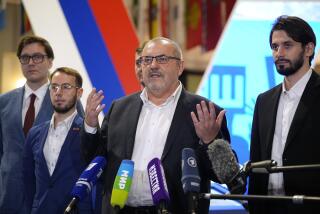Yeltsin’s Big Test Still Lies Ahead : April 25 referendum the key, even after Vancouver summit
- Share via
“We know where we stand,” said President Clinton in Vancouver. “We stand with Russian democracy. We are with Russian reforms. We are with Russian markets. We support freedom of conscience and religion. We support respect for ethnic minorities. We actively support reform and reformers and”--addressing President Boris N. Yeltsin directly--”you in Russia.”
Bold words, certainly sincere, and no doubt welcomed by the besieged Russian leader. But the fate of reforms in Russia at this moment has little connection with what was accomplished in Vancouver or with what might be done in Washington and other major capitals any time soon. The critical, perhaps decisive test of Russia’s reform efforts will come in less than three weeks, with the national referendum ordered by a legislature over which Yeltsin’s enemies hold sway. Voters will be asked four questions in the April 25 balloting: whether they have confidence in Yeltsin; whether they have confidence in his reforms; whether they favor early elections for the Congress; whether they favor an early election for the presidency. The key question is the first.
Even though Yeltsin has denounced the referendum he has nonetheless begun campaigning hard to try to turn it into a personal triumph. It is an uphill battle, given the electoral standard set by the Congress. To win, under this rule, Yeltsin must get half the votes of the total eligible electorate, not just half of those who bother to turn out. A poll published this week in Izvestia finds that Yeltsin can expect only 43% of that vote. Given the degree of apathy and cynicism toward politics that is now so evident in Russian life, Yeltsin’s chances of polling a majority seem less than bright.
NO ONE as yet has tried directly to link the U.S. Russian aid program or the much larger effort that will be considered by the major industrial countries later this year to Yeltsin’s survival in power. But inferentially at least the connection is apparent. The West’s interests demonstrably lie in seeing democratic institutions and free markets take root in Russia; that is the best assurance of a stable, non-confrontational relationship between a country that still possesses tens of thousands of nuclear weapons and the rest of the world. Yeltsin may not be the only leader who can push this process along and assure its success. But for now he is the only readily identifiable leader of national stature whose commitment to revolutionary change seems total.
If Yeltsin goes he almost surely would be replaced by someone from the ranks of those who have little faith in democracy or affection for market economics. In that dire event, the strongest political arguments for helping Russia during its perilous post-communist passage almost surely would become unsustainable.
The $1.6-billion aid package Clinton unveiled in Vancouver--all of it depending on previously appropriated funds--certainly won’t hurt Yeltsin. Whether it will help him to any noticeable degree in the April 25 referendum is something else. Clinton has gone as far as protocol allows-he may indeed have gone a bit further--to say things aimed at keeping Yeltsin in office. If events take a different turn, Washington could be confronted with the need for an agonizing reappraisal of its policy on Russia.
More to Read
Sign up for Essential California
The most important California stories and recommendations in your inbox every morning.
You may occasionally receive promotional content from the Los Angeles Times.













